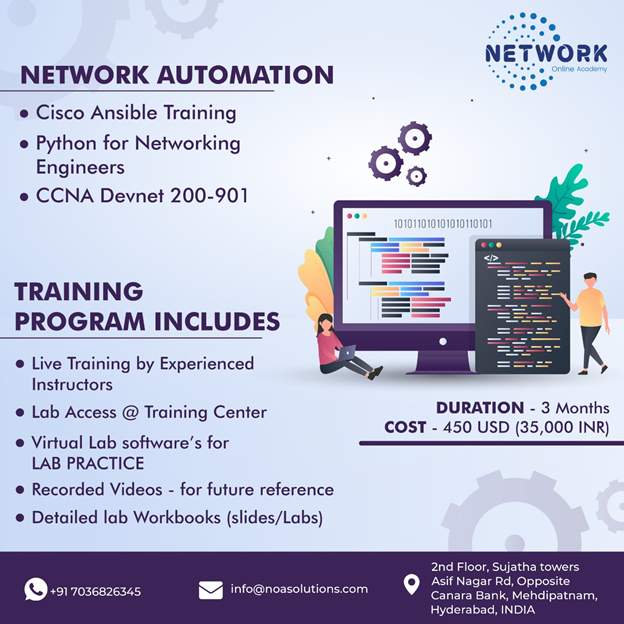Online Courses
- 1. Cisco Certified Network Associate - CCNA 200-301
- 2. CCNP ENTERPRISE – Core 350-401
- 3. CCNP ENTERPRISE – Advanced Routing 300-410
- 4. CCNP ENTERPRISE – SDWAN 300-415 – WAN Automation
- 5. SD-ACCESS – Cisco DNAC- LAN Automation
- 6. CCNP SECURITY - 350-701 Security Core
- 7. CCNP SECURITY - 300-730 Virtual Private Networks (VPN)
- 8. CCNP SECURITY - 300-710 Firepower + NGIPS
- 9. CCNP SECURITY – Web /Email Security (300-720/725)
- 10. CCNP SECURITY - 300-715 Identity Service Engine (ISE)
- 11. CCNP SERVICE PROVIDER – 350-501 Core
- 12. CCNP SERVICE PROVIDER – 350-510 Advanced Routing
- 13. CCNP SERVICE PROVIDER – 300-515 VPN Services
- 14. CCNP DATACENTER – 350-601 Core
- 15. CCNP DATACENTER – 300-620 ACI (Application Centric Infrastructure)
- 16. CCNP DATACENTER – Nexus
- 17. CCIE ENTPERISE INFRASTRUCTURE
- 18. CCIE Security
- 19. CCIE Service Provider
- 20. JNCIA - Enterprise Routing and Switching (JN0-102)
- 21. Cisco ASA firewall / Cisco Firepower-
- 22. Checkpoint Firewall (CCSA)
- 23. Fortigate Firewall (NSE 4-5 )
- 24. PaloAlto Firewall
- 25. F5 Load balancers – LTM
- 26. Python Programming – for Network Engineers
- 27. CCNA Devnet – 300-901
- 28. Cisco Ansible- Automating networks
- 29. Microsoft Certified Engineer ( MCSE 2016)
- 30. Vmware Vsphere 6.5
- 31. AWS Solutions Architect
- 32. Microsoft Azure Administrator

CCNA Devnet – 300-901
Duration: 6 weeks (120 min/day)
Price – 200 USD (15,000 INR)
DEMO VIDEO (YouTube links)
Training Program Includes
Contact us to reserve your slot for Online Trainings
For more Details Mail us on info@noasolutions.com
Faster communication – WhatsApp – +91 7036826345
Course Content

Cisco Devnet Associate 200-901
Achieving Cisco Certified DevNet Associate certification proves your skills in developing and maintaining applications built on Cisco platforms.
To earn DevNet Associate certification, you pass one exam that covers the fundamentals of software development and design for Cisco platforms.
This exam tests your knowledge of software development and design, including:
- Understanding and using APIs
- Cisco platforms and development
- Application development and security
- Infrastructure and automation
Who this course is for:
- Network automation engineer
- Software developer
- System integration programmer
- Infrastructure architect
- Network designer
Course Content
Module 1: Software Development & Design
- Lab 1: Software Development Life Cycle
- Lab 2: Waterfall Software Development
- Lab 3: Agile Software Development
- Lab 4: Lean Software Development
- Lab 5: Software Design Pattern
- Lab 6: Version Control Systems
- Lab 7: Setting up GIT
- Lab 8: Creating a new GIT Repo.
- Lab 9 : Introduction to ATOM IDE and Setting up
Module 2: Understanding and Using APIs
- Lab 22: Understanding and Using JSON, XML and YAML
- Lab 23: Understanding SOAP API
- Lab 24: Understanding RESTful API
- Lab 25: HTTP Methods and Response Codes
- Lab 26: Woring with REST API Client Tools
- Lab 27: Making REST API Calls using Postman
- Lab 28: Introduction to Python Library for Network Engineers
- Lab 29: Working with Python Library to make REST API calls
Module 3:Application Development with CISCO Platforms
- Lab 30: Understanding YANG Data Model
- Lab 31: Working with YANG Data Models
- Lab 32: Understanding NETCONF
- Lab 33: API Call with NETCONF using Python Library
- Lab 34: Understanding RESTCONF
- Lab 35: Constructing RESTCONF URIs
- Lab 36: REST API Call using Postman
- Lab 37: Introduction to Cisco DNA Center Web GUI
- Lab 38: Postman Setup for Cisco DNA Center REST API
- Lab 39: Working with CISCO Cloud Managed Network
- Lab 40: Working with CISCO Meraki API
- Lab 41: Understanding Cisco DNA Center Controller Architecture and Platform
- Lab 42: Exploring Cisco DNA Center
Module 4: Automation on Network Infrastructure
- Lab 43: Introduction to Infrastructure as a Code (IAAC)
- Lab 44: Introduction to DevOps
- Lab 45: Understanding DevOps Automation Tools
- Lab 46: Understanding an Ansible for Network Automation
- Lab 47: Lab Setup for Network Automation
- Lab 48: Creating Inventory in Ansible
- Lab 49: Creating Hosts file in Ansible
- Lab 50: Configuring an Ansible
- Lab 51: Understanding Playbook
- Lab 52: Creating first Playbook in Playbook (Ping, Dynamic Routing, Backup)
- Lab 53: Running Playbook
- Lab 54: Ansible Troubleshooting

